|
Three Years in the Life (Continued)

Ubon, Home of the Wolfpack
As I recall, our C-141 landed on the tarmac at mid-morning. As we were taxiing to our spot, the pilot opened the clam-shell
doors on the rear of the plane, and I immediately noticed the rush of humid heat working its way forward through the cargo
compartment of the plane. The heat and humidity seemed a lot worse here than at Utapao. Perhaps because it was so far inland,
and maybe because Utapao sat right on the Gulf of Siam which frequently resulted in somewhat of a sea breeze.
Thailand had a unique smell to it too that I can still remember. It didn't stink, but rather had a kind of sweet, sticky smell
in the air that I've never experienced anywhere else in the world. Don't misunderstand me though, there were some particular
smells that were not so sweet, and I could get by just fine if I never smelled them again. One was the stench in some of the
open air, and I use that term loosely, markets. The meat hanging from hooks and the fish, which were covered with flies just,
reeked. Another unique smell was from this fruit about twice the size of softball. It was green, had really sharp spines on
it. When it was cut open it had about 4 sections of soft matter that just looked and smelled like something you might find
in a baby's diaper. The name of this fruit was I believe a durian.
Being a veteran of Thailand, it took me no time at all to fit right into the scheme of things at Ubon. I had a distinct advantage
over a lot of the other guys that deployed in my group. One of the fellows that comes to mind was a guy named Butch Broadwater.
He was now going through the same culture shock adjustment that I experienced at Utapao a year earlier. Butch and I were both
aircraft electricians, and we were assigned to the same shift. We became very good friends over the course of our stay at
Ubon
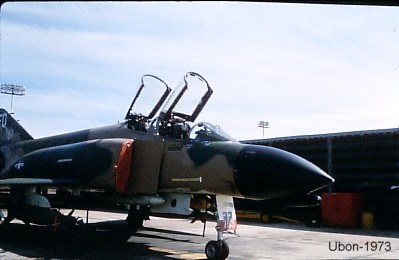
An Ubon F-4D
Unlike Utapao, this Electric Shop had a lot fewer people assigned to it, and everyone was dispatched to jobs from the shop
rather than from a truck. My most urgent tasking was to learn a new aircraft. I was sent there on temporary duty (TDY) from
Seymour Johnson to support our deployed F-4Es. Unfortunately, the only experience that I had was working on the B-52s while
at Utapao and Minot. A few of the guys in the shop resented this because they thought deploying a guy there to support aircraft
who had no experience on that aircraft was a poor way to do business and they had to pick up the slack. They were probably
right, but I didn't much care. I was in Thailand, which is exactly where I wanted to be. There was a Master Sergeant Hargett
assigned to the shop that took me under his wing though, and he taught me what he could whenever he could. I stuck with him
as close as I could because I was learning so much from him, and in no time at all I was able to hold my own on troubleshooting
and repairing the F-4s.
My first taste of the fighter aircraft caused me to do a great deal of cussing at McDonnel Douglas. They were the makers of
the F-4, and they cramped so many of the electrical components into such tight spaces that it was a real adjustment for a
guy coming off of B-52s where space wasn't as big of an issue when it came to deciding where to install an electrical black
box, inverter, transformer rectifier or other components. I was put on an 8-hour shift, but the days off were staggered; three
on two off, two on two off or something like that. Anyway, in no time at all I was right at home again.
I now had to figure out how to get Paiboon up to Ubon with me. I was able to get a message to her through my good friend Garland
down at Utapao, and we made arrangements to meet at the gate at a certain time on a certain date. I remember how happy I was
when I saw her that day . I could tell too that she was glad to see me after being separated for nearly 2 months. We found
a small bungalow not far from the gate, and I more or less abandoned my room in the barracks. I maintained a room there because
I was required to, but I really couldn't have spent any less time there.
I was back in heaven again, but this time I wasn't going out partying and hitting the clubs almost every night like when I
was at Utapao. We would go out dancing in some of the clubs like the one at the Ubon Hotel once in awhile, but mostly we just
enjoyed spending time with each other. I can remember going to see a lot of movies too, and that could be an experience over
there. We would go to watch an Indian movie, with Thai dialect, and with English and Chinese subtitles. American movies were
humorous, because we could watch our favorite heros like John Wayne speak thai with a squeaky voice. Unlike stateside concessions,
we could also have anything in the theater from sugar cane and fresh pineapple to curry chicken on a stick. Martial arts movies
were the big thing back then, and Bruce Lee was everyone's hero.
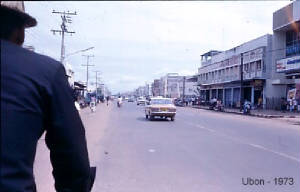
A view from a Samlar
Transportation was a little different here than at Utapao too. Since the base was right at the edge of this reasonably sized
town, Samlars were a convenient way to get around. These were the 3-wheeled pedal cycles with a retractable canopy. We could
generally go just about anywhere in town for just a few baht, but we had to be sure to haggle and agree on a price before
getting under way. Sometimes just for kicks, we would ask to trade places with the driver just so we could experience driving
one. Not all of them would let us drive though because they were so proud of their machines. While waiting for fares, they
would frequently be seen polishing their trikes. This after all, was their sole means of earning a living, so a lot of them
were a little hesitant to let the GIs screw around on them.
There was a very good bus system that ran through town and the base. This usually was the best way to go longer distances
short of using a taxi. They could really pack the people on those buses too. There usually was a young guy or girl who worked
their way around in the bus to collect the fare. I remember them carrying an odd looking tin cylinder with a hinged side on
it, which would hold the coins and the tickets. Now that I think about it, I can still hear people yelling "Jot dooey"
for the driver to stop, and the fare collector shouting "bye layo" for the driver to go.
These buses rarely came to a complete stop to let people off unless there were a lot of people waiting at the bus stop to
get on. It's a wonder more people were not hurt or killed. I remember making a complete fool out of myself one afternoon
when I thought the bus had slowed down enough for me to get off. Man-O-Man you should've seen it! As soon as my first foot
hit the ground I really began high stepping to stay upright. I never knew I could run so fast. Actually I couldn't, because
in a second or two I lost it and began to roll. Naturally my first instinct after stopping was to look around to see who saw
my stunt. Luckily I wasnt hurt. The only thing that was bruised was my ego. As the bus accelerated, the people looked back
laughing, probably saying to themselves "GI Ba-Ba, Ba-Bo", meaning; Crazy GI.
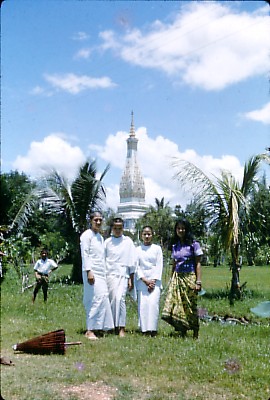
Bhuddist Nuns and Paiboon at Tot Phanom
On my days off, Paiboon and I would sometimes take trips outside the city of Ubon. One such trip was north of Ubon to a place
called Tot-Phnom. We teamed up with a Staff Sergeant from my shop named Burns and Pam his tee-lok. I remember Tot-Phnom had
this beautiful temple with a white tower outlined in gold, and there were Bhuddist nuns who lived on the grounds. These Nuns
had their heads shaved and they wore white robes, which was an unusual sight to us because we had grown accustomed to seeing
the monks who wore the saffron robes. We traveled further north to a place directly across the Mekong River from a city in
Laos called Savanneket.
This fellow Burns was a real comedian who was always causing a stir of some sort in the shop. One day when we were at work
he said to the shift supervisor "Hey Sergeant Berube, do you know what an elephant fart sounds like?" Sergeant Berube
said "No, what" and Burns responded slowly in a really deep voice "Berr..Ooooooo..Bee". He had everyone
in the shop pronouncing Sergeant Berube's name that way after that.
Ubon had a much different atmosphere than Utapao. Being relatively close to the Laotian border and much further from Bangkok,
there was a large Lao influence in the local population. This showed up in the language and in the food. After spending a
year at Utapao, I could get by with fairly well with the Thai language, but at Ubon I had to learn a few new words due to
the Laotian influence in the area. I think it would be much like comparing a city in California to say one in Kentucky. I
really enjoyed Ubon, but more because of whom I was spending my time with rather than where I was.
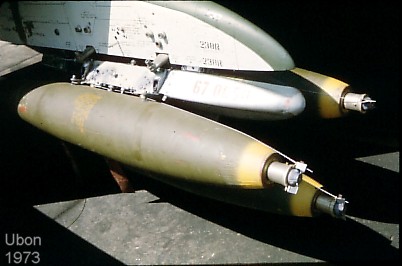
Ready for delivery
The summer of 1973 was moving right along. Back in the States the news was more about Watergate and Nixon's troubles rather
than the war. Our POWs were released and sent back home, and Vietnamization was now the new buzzword of the day. The war continued
somewhere though, because we were still launching loaded planes towards the east and they were coming back empty. From time
to time I wondered where they were going and what they were bombing, but like everyone else, I just did my job. I knew it
wouldn't do any good to ask because I just would've been told that I didn't have "the need to know".
I was getting my first exposure to the more sophisticated weapons of the time while at Ubon. Some of the F-4s were now flying
with the Smart laser guided bombs, and some would fly with no bombs at all. They were the ones which would circle high above
and direct the laser onto the target for those carrying the smart weapons. Besides the F-4Es from Seymour Johnson, Eglin and
Homestead Air Force Bases, Ubon also had some F-4Ds, AC-130 gunships, C-47s, and Pedro helicopters. There were also a few
Jolly Green Giant helicopters assigned there. The Thai Air Force had a unit with a few planes assigned too, but don't ask
me what they were.
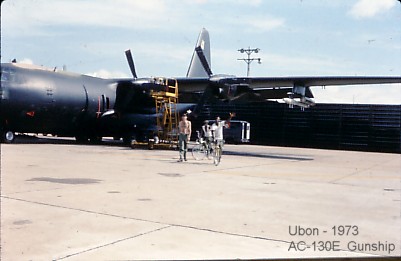
AC-130 Gunship
I learned that the folks associated with these fighter aircraft definitely had a much bigger chip on their shoulders than
the B-52 and tanker crews at Utapao. One day at a commanders call we had one of the fighter jocks as a guest speaker come
in and explain just how the smart bombs work. I don't remember how the subject came up, but I do remember him alluding to
the fact that the B-52s weren't really flying combat missions. He said "when you fly that high and drop that many bombs,
youre bound to hit something". He went on to boast about how it only took them one bomb to take out a bridge and how
with B-52s it would take 50 or more. I had to bite my lip, because I saw first hand during the Linebacker I and II operations
how those B-52 crews performed. On top of that, it was about a 12-hour mission for those poor crews flying from Guam.
Those fighter jocks were definitely a different breed. I recall even the Wing Commander Colonel getting into hot water over
there because his tee-lok wrecked his staff car. Because of it, he was relieved of duty and replaced with another Colonel.
I was able to make one trip down to Utapao during my stay at Ubon. I flew Space Available on the Klong Hopper. That's what
we called the C-130, which made a circle around the country stopping at every major US Air Force base each day. It was really
great seeing my friend Garland again and to once again walk the streets of Newland. Garland brought his American wife Lois
over from the States to be with him, so I got to meet her for the first time.
I ran into a little trouble trying to get on the plane when it was time to return to Ubon. It seems there wasn't any room
for space available passengers, and I needed to get back to Ubon for work the next day. Due to the distance, there was no
way I could get back in time unless I flew. I looked up another friend of mine who worked in transportation, told him my predicament,
and asked him if there was anything he could do. After he made a quick phone call, he told me to report to the terminal and
tell them my name and where I wanted to go. When I did so, the young sergeant at the counter smiled and said I was selected
to be a cargo courier, and that I was to deliver an envelope to a Sergeant so-and-so at the Ubon terminal. It worked like
a champ. I would've been bumped off the flight at Dang-Muang airport in Bangkok had it not been for the cargo courier duties.
Time just flew by during that summer. In August the personnel from Seymour Johnson were to be swapped out with fresh faces,
and I asked to be allowed to stay for another six months. My shop-chief back at Seymour Johnson had no problem with that,
since he was having difficulty getting volunteers to replace us anyway. The only stipulation was that I had to return to Seymour
with my crew and return with the replacements. At that time if you were TDY to Thailand for more than 180 consecutive days,
it was counted as a short tour and they didn't want folks getting credit for a short tour while only spending a few days longer
than six months there. After all, they needed to keep the supply of troops available for the Vietnam tours.
It was all set. During the 3rd week of August I was to fly back to Seymour Johnson for just a few days just to process in
and out and then return for another six months. In the mean time, I submitted a dream sheet with Thailand on it and was hoping
to soon get selected for another one-year tour. Paiboon and I began to hint about marriage, but as long as I was returning
for another six months there was no real need to rush into anything.
Then just two days before I was supposed to leave, I was told to report back to work. Something was going on and our return
to the States was being delayed indefinitely. A few days later, my worst fears were realized. We were called into a briefing
room and told by our deployed commander that the draw-down was beginning, and that Seymour Johnson was packing up and going
home for good. This really ruined my plans, because now my only chance of getting back to Thailand was to get selected for
another tour.
Unfortunately, the rules back then dictated that you must be stateside for at least one full year before you can be sent overseas
again. It had only been seven or eight months since I completed my tour at Utapao, and if a draw-down was now beginning, that
meant my chances of getting selected for another tour would be even less if bases started closing. I was screwed. I was about
to be sent back to the US not knowing if or when I might ever return. It was a sad time for both Paiboon and I, because we
didn't know what the future held for us.
A friend of mine, who was married to a Thai, gave me the name and address of a Chief who worked at Airmans Assignments at
Randolph Air Force Base in Texas. He told me to write him a letter and ask what he could do for me. He told me thats what
he did, and he got sent back to Ubon. I did as he advised, but it would be weeks before I would hear from him, and then I
didn't get the response from him that I wanted. He simply confirmed what I knew all along, and that was that I had to be assigned
stateside for at least one year before I could go overseas again. He assured me however, if I had a volunteer statement in
that I would again be considered for an assignment to Thailand when that year was up.
I was really sad when I had to leave Utapao, but nothing like I felt when I had to leave Paiboon under these circumstances
of not knowing when I would be able to return. She decided to go back down to Utapao to be with her friends. At least my friend
Garland was going to be there for a few more months so he could translate my letters to her and write letters for her to send
to me.
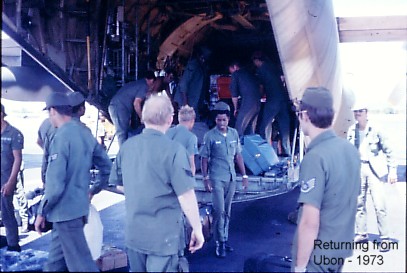
Returning From Ubon
I was tasked to be a member of an En-route Support Team to assist with ferrying aircraft out of Thailand. We loaded up our
equipment on a C-130, and after a night in Guam and a refuel stop at Midway Island, we flew across the Pacific to Hickam Air
Force Base in Hawaii. I spent the next two weeks there assisting in recovering and launching aircraft, which were hopping
back to the States from Thailand. Not only were our aircraft from Seymour returning stateside, but many of the aircraft from
other bases in South East Asia as well. When our en-route support resources were no longer needed at Hickam, we returned to
Semour Johnson after a one-night layover at George Air Force Base. George was a base in the Mojave Desert just outside of
Victorville California. I can still remember looking out across the desert that evening at George, and thinking to myself
"thank God I'm not stationed at this hell hole". Little did I know then that I would return to spend two years there
from 1988 to 1990.
Back at Seymour now, I was working swing shift in the shop to where I was officially assigned since January, but yet knew
very little about. Even though I was a member of the shop for eight months, I now had to learn the names of my fellow electricians
and learn where everything was. One welcome change was that we were now taking delivery of brand new F-4Es from the McDonnel
Douglas factory in St. Louis Missouri. This was great after working on those older F-4s that we had in Thailand.
Seymour was a gung-ho fighter wing. In the early 70s, it was perhaps the premier fighter unit in the Air Force. They even
had a big sign at the main gate, which read "Welcome to the 4th Tactical Fighter Wing, Fourth but First". This meant
it may be the 4th Wing, but it's the first to be sent anywhere. With brand new F-4s, that made all of the commanders that
much more gung-ho, because they knew that if fighter force was needed somewhere in the would that the 4th Tactical Fighter
Wing was going to be called upon.
One time real early on a Saturday morning, we had a base wide recall. On our way to the shop we noticed that the guys from
the corrosion control shop were busy out on the ramp painting over the US markings on the brand new F-4s weve been receiving.
We were later briefed that Egypt and Israel were now at war and that our new planes were being sold to Israel. It bothered
a lot of us that we would keep our old warplanes which we just bought back from Thailand, and sell our brand new ones to the
Israelis, but then that's politics. Lucky for us, our involvement in that conflict only consisted of flying our planes to
the Azores for delivery to the Israeli pilots.
The letter writing between Paiboon and I continued. I would get a letter from her about every two weeks. I really missed her,
and prayed everyday for an assignment back to Thailand. I would send her money through Garland but I couldn't afford to send
much on what they were paying me as a single E-4 living in the barracks back then. I still had monthly payments on my Camaro
plus car insurance too. I even took a part time job working a mid-shift at one of the local convenience stores so I could
afford gas. This was a big change after living in Thailand and having my US dollar go so much further.
Continued in Written Memories Part IV
Access is on the Left Side of This Page
or by clicking on the link below
Written Memories Part IV
|
